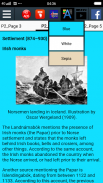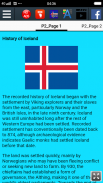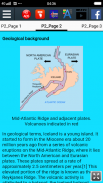








History of Iceland

History of Iceland介绍
The recorded history of Iceland began with the settlement by Viking explorers and their slaves from the east, particularly Norway and the British Isles, in the late ninth century. Iceland was still uninhabited long after the rest of Western Europe had been settled. Recorded settlement has conventionally been dated back to 874, although archaeological evidence indicates Gaelic monks had settled Iceland before that date.
The land was settled quickly, mainly by Norwegians who may have been fleeing conflict or seeking new land to farm. By 930, the chieftains had established a form of governance, the Althing, making it one of the world's oldest parliaments. Towards the end of the tenth century, Christianity came to Iceland through the influence of the Norwegian king Olaf Tryggvason. During this time Iceland remained independent, a period known as the Old Commonwealth, and Icelandic historians began to document the nation's history in books referred to as sagas of Icelanders. In the early thirteenth century, the internal conflict known as the age of the Sturlungs weakened Iceland, which eventually became subjugated to Norway through the Old Covenant (1262–1264), effectively ending the commonwealth. Norway, in turn, was united with Sweden (1319) and then Denmark (1376). Eventually all of the Nordic states were united in one alliance, the Kalmar Union (1397–1523), but on its dissolution, Iceland fell under Danish rule. The subsequent strict Danish–Icelandic Trade Monopoly in the 17th and 18th centuries was detrimental to the economy. Iceland's subsequent poverty was aggravated by severe natural disasters like the Móðuharðindin or "Mist Hardships". During this time the population declined.
Iceland remained part of Denmark, but in keeping with the rise of nationalism around Europe in the nineteenth century an independence movement emerged. The Althing, which had been suspended in 1799, was restored in 1844, and Iceland gained sovereignty after World War I, on 1 December 1918. However Iceland shared the Danish Monarchy until World War II. Although Iceland was neutral in the Second World War, the United Kingdom peacefully occupied it in 1940 to forestall a Nazi occupation, after Denmark was overrun by the German Wehrmacht. Because of the island's strategic position in the North Atlantic, the allies occupied the island until the end of the war, the United States taking over occupation duties from the British in 1941. In 1944, Iceland severed its remaining ties with Denmark (then still under Nazi occupation) and declared itself a fully independent nation. Following the Second World War, Iceland was a founding member of both the United Nations and the North Atlantic Treaty Organization. Its economy grew rapidly largely through fishing, although this was marred by conflicts with other nations.
Following rapid financial growth, the 2008–11 Icelandic financial crisis occurred. Iceland continues to remain outside the European Union.
Because of its remoteness, Iceland has been spared the ravages of European wars but has been affected by other external events, such as the Black Death and the Protestant Reformation imposed by Denmark. Iceland's history has also been marked by a number of natural disasters.
Iceland is a relatively young country in the geological sense, being formed about 20 million years ago by a series of volcanic eruptions in the Mid-Atlantic Ridge. The oldest stone specimens found in Iceland date back to ca. 16 million years ago.
冰岛的历史记录被海盗探险者和他们的奴隶从东,尤其是挪威和英伦三岛,在九世纪末开始与结算。西欧其他地区已经解决后,冰岛仍无人居住长。记录结算一直以来追溯到874,虽然考古证据表明盖尔语僧人在该日期前已经解决了冰岛。
土地被迅速解决,主要是由挪威谁可能已逃离冲突和寻求新的土地耕种。通过930,头领建立了政,冰岛议会的形式,使之成为世界上最古老的议会之一。迈向第十个世纪末,基督教通过挪威国王奥拉夫特里格瓦松的影响来到冰岛。在此期间,冰岛保持独立,被称为旧英联邦一段时间,和冰岛历史学家开始记录国家的历史中被称为冰岛人的传奇书。在十三世纪初,被称为Sturlungs年龄的内部冲突削弱冰岛,最终成为第一个通过旧约(1262年至1264年)征服挪威,有效地结束联合体。挪威,反过来,与瑞典(1319),然后丹麦(1376)团结。最终,所有北欧国家在一个联盟,卡尔马联盟(1397年至1523年)的团结,但在其溶解,冰岛丹麦统治下跌。随后严格丹麦,冰岛的行业垄断在17和18世纪是不利于经济。冰岛后来的贫穷是由严重的自然灾害,如Móðuharðindin或“雾卧薪尝胆”加剧。在此期间,人口下降。
冰岛仍然丹麦的一部分,但在与民族主义的兴起在十九世纪欧洲各地保持独立运动出现了。在冰岛议会,已被暂停在1799年,恢复于1844年,和冰岛第一次世界大战后获得了主权,12月1日1918年冰岛但是共享的丹麦君主制,直到第二次世界大战。虽然冰岛在第二次世界大战是中性的,英国的和平占领了它在1940年以阻止纳粹的占领,丹麦被德国国防军超限后。因为在北大西洋岛屿的战略地位,盟军占领该岛,直到战争结束后,美国接管了职业责任由英国于1941年在1944年,冰岛切断其剩余的联系与丹麦(当时仍在纳粹占领),并宣布自己一个完全独立的国家。继第二次世界大战,冰岛既是联合国和北大西洋公约组织的创始成员之一。它的经济迅速增长主要是通过钓鱼,虽然这与其他国家的冲突破坏了。
继快速财政增长,出现了2008 - 11年冰岛金融危机。冰岛继续留在欧盟之外。
由于其地处偏远,冰岛一直不遗余力欧洲战争的蹂躏,但已受到其他外部事件,比如黑死病和丹麦实行宗教改革。冰岛的历史也被打上了一些自然灾害。
冰岛是在地质意义上的相对年轻的国家,被约20万年前由一系列在大西洋中脊火山喷发形成的。在冰岛发现的最古老的石头标本可以追溯到约1600万年以前。























